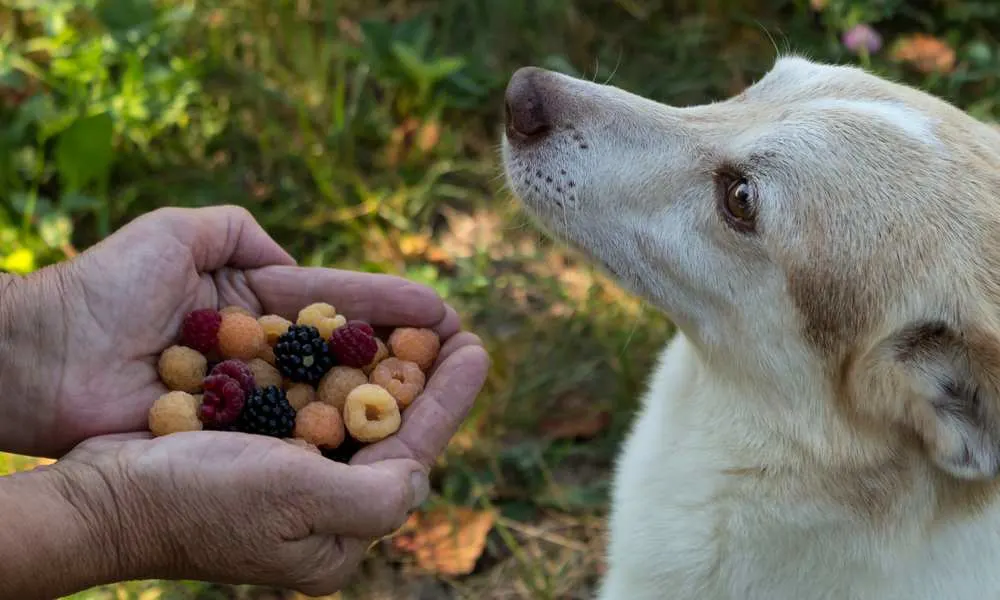The Facts About Feeding Your Dog Blackberries:
If there is one thing dogs have learned through their centuries-long existence with us humans, it is how to beg for food. This is no more evident than when we are trying to eat something in their company.
Oh, those looks. That tilt to the head. Those wanting eyes. It is very hard to resist such pleading efforts but resist we must, at least until we learn what foods are good for their health.
That leads us to our current question: Can dogs eat blackberries?

Learn The Foods You Mustn’t Give To Your Dog
In a word, yes. In other words, blackberries are not on the list of foods that you must not feed your dog. While blackberries are not poisonous, they are potent, so the word of caution is moderation.
Blackberries Are Powerful Little Goodies
Blackberries are among the tiny fruit that packs a powerful punch, both for our dogs and for us! Here is an overview:
1. They are highly nutritious containing minerals such as manganese and folate and vitamins A, B, C, E, and K. These nutrients help support the following:
- Immune system
- Enzyme activation
- Synthesizing hormones
- Metabolism
- Energy levels
- Growth stimulation
- Reducing inflammation
2. They are high in Omega-3 fatty acids instrumental in producing strong teeth, healthy skin, and a shiny coat.
3. They are high in fiber, which helps with digestion.
4. They are a source of antioxidants. These anthocyanins are commonly found in deeply colored red, blue, and purple foods. The benefits of anthocyanins include:
- Anti-inflammatory properties
- Anti-viral effects
- Improved brain function
- A reduction in the risk of cancer and heart disease
5. They are low in sugar content. They do contain xylitol, which can cause concern since this is included in the list of bad foods. However, the volume is so small as to preclude any negative effects unless your pup is feasting on them. Again, the watchword is moderation.
Routine Is Good When It Comes To Your Dog’s Diet
Most dog owners recognize the importance of a regular diet for their dogs. It is not a good idea to change up their routine, otherwise, you end up with some dramatic reactions, such as vomiting or diarrhea, or even gastrointestinal problems.
It is easy enough to evaluate through deducing the foods your dog has eaten and the time it takes for a reaction such as abnormal stool. Acute onset diarrhea is typically cleared within a few days. It would not be difficult to narrow it down if the dietary indiscretion of a few too many blackberries was the cause.
We Share Similarities With Our Dogs
The more we learn, the more we realize dogs and humans have more in common regarding our digestive systems than previously thought. More so, in fact, than compared to pigs or mice, as we are typically taught to believe. However, this does not mean we are the same in the ways we digest foods.
For example, the time it takes for food to pass through your dog’s system is anywhere from six to eight hours whereas, for yourself, it is 20 to 30 hours.
Big difference. That is good, though, because you don’t have to wait as long to evaluate your dog’s response to something he recently ingested.
Mind The Carbs
Another precaution with blackberries is their carbohydrate content. Tiny they are, yes, but they are high in carbs. While dogs have adapted to our high carb diets since we are so good at offering them tidbits from our plates, truth be told, if your dog self-regulates his diet, he would seek a lower carb ratio by comparison.
In a study that monitored a dog’s self-selected diet, the ratio of protein:fat:carbohydrates approximated 30:63:7 percentage ratios, respectively. As you can see, dogs are partial to a high-fat diet. Carbs are very low on their list of preferred content.

Can Dogs Eat All The Berries?
We are indeed advised to eat lots of nuts and berries; this is not so true for our dogs. For one thing, the blackberry isn’t a berry, to begin with. It is a type of small fruit referred to as an aggregate. They derive from a single flower with many pistils.
You should avoid rationalizing the blackberry content in either frozen blackberries or blackberry jam simply due to the probably added sugar content. We are learning more about how dangerous sugar is to our human diet. There is no need to add any more to your dog’s diet since they get all they need from the carbs they consume.
You can offer your dog strawberries, blueberries, raspberries, and cranberries without worrying if they will poison your dog. With all the berries, allow them in moderation. For a small pup, perhaps two or three per day. For a large dog, you might offer as many as half a dozen considering their body weight.
Berries To Avoid
There is a multitude of berries on the planet, and depending on your geographical region, you may be tempted to try them all. However, I submit this list of berries to avoid so that you are not faced with the potential vomiting and diarrhea, but more seriously, excessive drooling, difficulty breathing, or even seizures:
- Gooseberries
- Holly berries
- Mistletoe Berries
- Baneberries
- Salmonberries
- Pokeberries
- Dogwood berries
- Juniper berries
These wild berries are typically toxic. Stick to the berries you can find in the produce section at your local grocer and choose the freshest ones.
Enhance Your Home Made Treats With Blackberries
I have used a variety of fruits and vegetables when making homemade treats for my dogs, including blackberries. I follow the recipes to be sure I am using the recommended ingredients for the most nutritious treats. I also like to use cookie cutters that give me the shapes of bones and fire hydrants. Even if my pups don’t appreciate the humor, they still receive the love.

Final Thoughts
Remember to be thoughtful and care about regulating the amount your dog consumes. As you know, left to their own devices, sometimes they can get a little carried away. At least their gag reflex is naturally in high gear, so typically the first response to over-indulgence is to simply throw it back up.
You can avoid the pitfalls and potential discomfort by exercising the guidance of a loving handler. You know your dog looks to you for his best care and treat, and for that, he gives you his undying loyalty in return.
Learn More: What Can Dogs Eat? A Comprehensive List Of Dog-safe Foods

